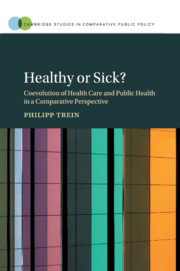Book contents
- Frontmatter
- Dedication
- Contents
- List of Figures
- List of Tables
- Acknowledgments
- Acronyms
- 1 Introduction
- 2 Sectoral Coupling of Health Care and Public Health
- 3 Theoretical Priors
- 4 Global Context and Case Selection
- 5 United Kingdom: Institutional Unification and Tight Coupling of Health Care and Public Health
- 6 Australia: Politicized Professions and Tight Coupling of Health Care and Public Health
- 7 Germany: Dominance of Individual Health Care and Decoupling from Public Health
- 8 Switzerland: Institutional Fragmentation, Depoliticized Health Professions, and Noncoupling
- 9 United States: Politicized Professions and Loose Coupling of Health Care and Public Health
- 10 Coevolution of Policy Sectors: Health Care and Public Health in a Comparative Perspective
- Appendix A
- Appendix B
- Notes
- References
- Index
6 - Australia: Politicized Professions and Tight Coupling of Health Care and Public Health
Published online by Cambridge University Press: 27 July 2018
- Frontmatter
- Dedication
- Contents
- List of Figures
- List of Tables
- Acknowledgments
- Acronyms
- 1 Introduction
- 2 Sectoral Coupling of Health Care and Public Health
- 3 Theoretical Priors
- 4 Global Context and Case Selection
- 5 United Kingdom: Institutional Unification and Tight Coupling of Health Care and Public Health
- 6 Australia: Politicized Professions and Tight Coupling of Health Care and Public Health
- 7 Germany: Dominance of Individual Health Care and Decoupling from Public Health
- 8 Switzerland: Institutional Fragmentation, Depoliticized Health Professions, and Noncoupling
- 9 United States: Politicized Professions and Loose Coupling of Health Care and Public Health
- 10 Coevolution of Policy Sectors: Health Care and Public Health in a Comparative Perspective
- Appendix A
- Appendix B
- Notes
- References
- Index
Summary
- Type
- Chapter
- Information
- Healthy or Sick?Coevolution of Health Care and Public Health in a Comparative Perspective, pp. 113 - 139Publisher: Cambridge University PressPrint publication year: 2018



